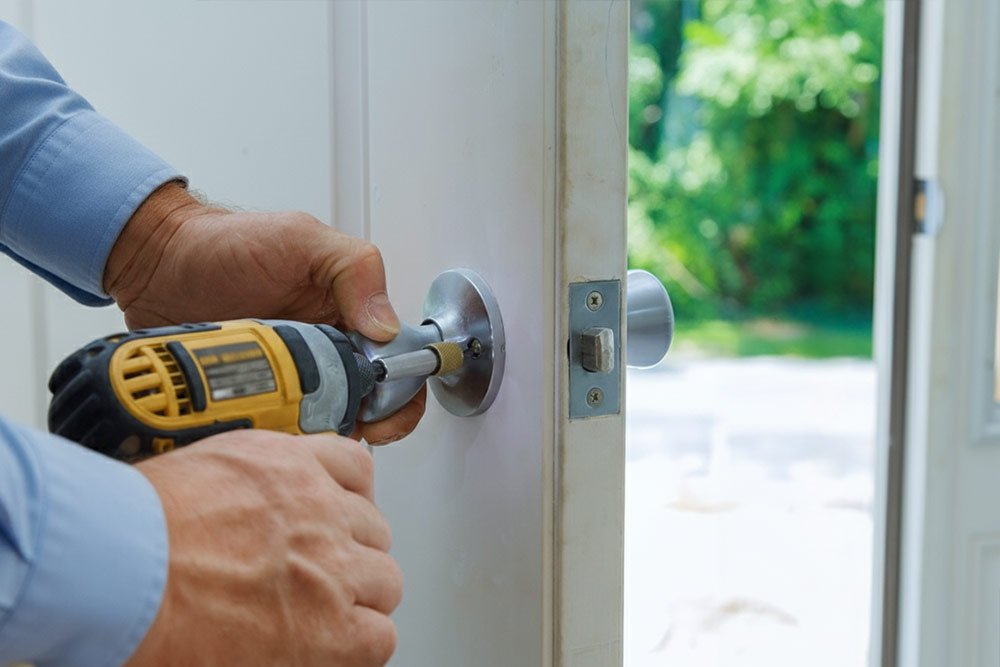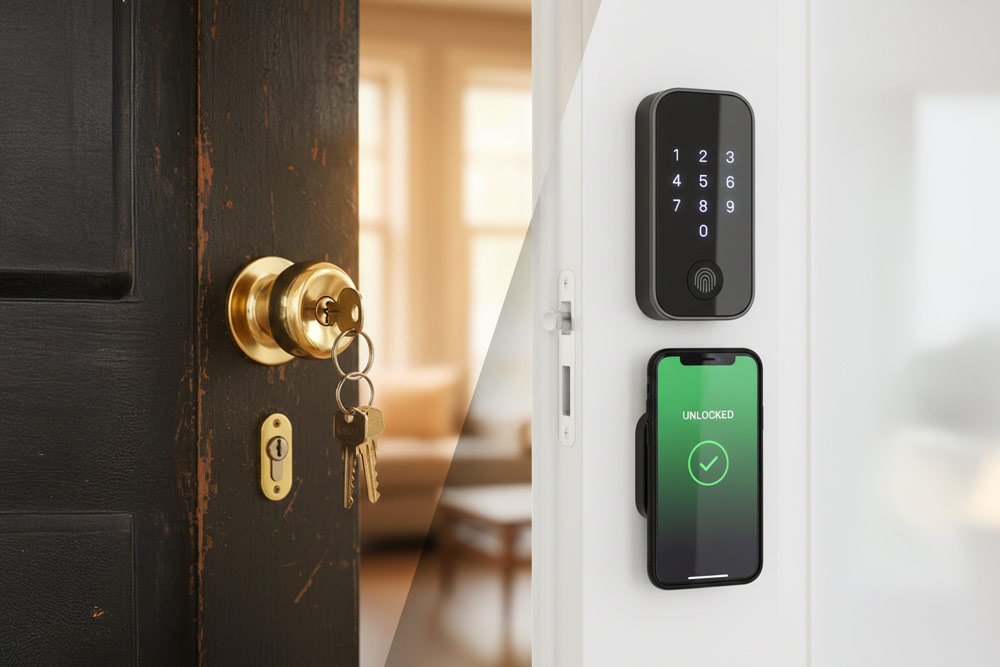Moving into a new home is exciting. Whether it is your first apartment, a family house, or an investment property, starting fresh in a new space feels like a milestone. But one critical task often gets overlooked in the chaos of unpacking boxes, signing paperwork, and setting up utilities: house lock change.
Changing your locks after moving is not just a precaution—it is a vital step in protecting your new property and family. You never know who might have a copy of the old keys, from real estate agents and contractors to previous owners and their acquaintances.
In this guide, we’ll walk through a complete house lock change checklist, why it matters, the best options available, and professional tips to keep your home secure.
Why House Lock Change is Important After Moving
Many homeowners delay changing their locks because they assume it is unnecessary, especially if the previous owners seemed trustworthy. However, statistics tell a different story:
According to the FBI, more than 60% of burglaries involve unlawful entry without force—meaning a door was likely unlocked or opened with a key.
A home without upgraded locks is 300% more likely to be targeted by burglars compared to one with modern security features.
That means ignoring a lock change could leave your home vulnerable from the very first night. When you take ownership of a new property, you inherit more than the walls and furniture. You also inherit the security—or lack thereof—that came with it. Here are some key reasons a house lock change should be a top priority:
1. Unknown Key Holders
The previous homeowners may have distributed spare keys to babysitters, friends, neighbors, contractors, or even Airbnb guests. Without a lock change, any of them could still gain access.
2. Peace of Mind
Nothing beats the confidence of knowing you are the only one who controls access to your home. A lock change gives you peace of mind from day one.
3. Preventing Burglary Risks
Homes with unchanged locks are more vulnerable to break-ins. Intruders may not even need to break a window or force a door—they might already have a key.
4. Insurance Compliance
Some insurance providers require proof of a house lock change when moving into a new property. Neglecting this step might affect your coverage in case of theft.
5. Smart Security Upgrade Opportunity
If your new home has outdated locks, a lock change is the perfect time to upgrade to modern, tamper-resistant, or smart locking systems.
The House Lock Change Checklist: Step-by-Step Guide
To make the process simple, here’s a complete house lock change checklist you can follow after moving:
Step 1: Identify All Entry Points
Walk around your home and make a list of all doors and locks that need attention. Common entry points include:
- Front door
- Back door
- Side doors
- Garage entry
- Basement doors
- Sliding patio doors
- Gates and outdoor sheds
Do not forget secondary access points—burglars won’t.
Step 2: Decide Between Rekeying or Replacing
There are two main ways to secure your locks:
- Rekeying: A locksmith changes the internal pins of your existing locks so old keys will not work. This is usually cheaper and faster.
- Replacing: Installing entirely new lock hardware. This is ideal if the locks are old, damaged, or if you want a style or technology upgrade.
Pro tip: If the locks are relatively new and high-quality, rekeying may be sufficient. But if they are worn out, corroded, or builder-grade, replacement is a better investment.
Step 3: Choose the Right Lock Type
When doing a house lock change, consider the type of locks that suit your lifestyle and budget. Options include:
- Deadbolts (single or double-cylinder for maximum security)
- Keyless entry locks (PIN code access)
- Smart locks (Wi-Fi or Bluetooth enabled, allowing remote control and monitoring)
- High-security locks (drill-resistant, pick-resistant, and bump-proof)
- Mortise locks (heavy-duty, great for durability and style)
Step 4: Purchase Quality Locks
Do not settle for cheap locks that can be easily bypassed. Look for locks that are ANSI Grade 1 or Grade 2 certified. These standards ensure durability and resistance to forced entry.
Step 5: Hire a Professional Locksmith (Optional but Recommended)
While DIY lock changes are possible, hiring a professional locksmith ensures:
- Correct installation
- Re-keying precision
- Security consultation on weak points in your home
- Recommendations for additional security upgrades
Step 6: Change Locks Immediately After Moving
Do not delay your house lock change. Ideally, it should be done on the same day you move in, before you spend your first night there.
Step 7: Test the New Locks
- Ensure keys turn smoothly.
- Confirm the lock engages properly.
- Test from both inside and outside.
Step 8: Make Spare Keys
Once the new locks are installed, create spare keys for trusted family members only. Keep track of who has them to maintain full control.
Step 9: Secure Secondary Entry Points
People often forget garage doors, sheds, or sliding glass doors. Consider adding locks, security bars, or smart monitoring systems to these areas.
Step 10: Update Your Security Habits
A lock change alone will not secure your home unless paired with good habits:
- Always lock doors, even when at home
- Use deadbolts and door chains
- Do not hide spare keys under mats or flowerpots
- Consider a video doorbell for added protection
Common Mistakes Homeowners Make with House Lock Change
Even with the right intentions, many homeowners make errors when changing locks. Avoid these pitfalls:
- Only changing the front door lock and ignoring other access points.
- Choosing the cheapest locks that compromise security.
- Delaying lock changes and leaving the property vulnerable for days or weeks.
- Forgetting windows and sliding doors that also require reinforcement.
- Not consulting a locksmith when unsure about the right type of lock.
Smart Lock Options for Modern Homes
With technology advancing, many homeowners now prefer smart locks for convenience and added safety. When doing your house lock change, consider these benefits:
- Remote control: Lock and unlock doors from your smartphone.
- Temporary codes: Provide access to guests or workers without giving them physical keys.
- Integration with home security systems: Connect with cameras, alarms, or smart assistants.
- Activity tracking: Get notifications on who enters and when.
Popular smart lock brands include Schlage, August, Yale, and Kwikset.
DIY vs. Professional House Lock Change
Should you handle a lock change yourself or call a locksmith? Here is a quick comparison:
| Aspect | DIY Lock Change | Professional Locksmith |
| Cost | Lower (you only pay for locks) | Higher (labor included) |
| Skill Needed | Moderate (basic tools required) | None |
| Security Level | Depends on accuracy of installation | Guaranteed precision |
| Time | May take longer if inexperienced | Usually completed within an hour |
| Added Services | None | Security consultation, rekeying, emergency services |
If you are handy with tools and on a budget, DIY works. But for maximum security and reliability, a locksmith is worth the investment.
Additional Security Measures to Consider After Moving
A house lock change is the first step, but not the only one. For complete protection, also consider:
- Installing a home security system with cameras and alarms
- Adding motion-sensor lights around entrances
- Upgrading window locks or adding security films
- Reinforcing door frames and strike plates against kick-ins
- Getting a safe for valuables and important documents
Frequently Asked Questions About House Lock Change
- How soon should I change locks after moving?
Ideally, immediately upon moving in to ensure no one else has access. - Should I re-key or replace locks when moving?
If the locks are in good shape, rekeying is usually enough. But if they are old, low-quality, or you want smart features, replacement is better. - How much does a house lock change cost?
On average, rekeying costs $15–$30 per lock plus locksmith labor, while full replacements range from $40–$300 depending on the type and brand. - How long does it take to change locks?
A professional locksmith can rekey or replace a lock in 10–30 minutes. A DIY replacement may take longer. - Can I change locks myself?
Yes, with basic tools and instructions. However, mistakes can compromise security, so professional help is recommended if you are unsure. - Should I change garage and shed locks too?
Absolutely. Any access point can be exploited by intruders. - What’s the best way to secure all entry points?
Use a combination of high-quality locks, security cameras, outdoor lighting, and reinforced doors/windows.
Final Thoughts: Secure Your New Home with a Proper House Lock Change
A house lock change may seem like a small detail in the moving process, but it is one of the most important steps to secure your home and family. The checklist provided ensures you don’t miss anything—from identifying entry points to upgrading locks and updating your security habits.
By rekeying or replacing your locks immediately, investing in quality lock systems, and considering modern smart options, you gain both safety and peace of mind. Whether you do it yourself or hire a locksmith, changing your locks after moving is a non-negotiable task every homeowner should prioritize.
✅ Key takeaway:
- Prioritize changing or rekeying all locks immediately after moving.
- Choose high-quality, secure locks suited to your needs.
- Consider professional installation for optimal security.
- Don’t forget other access points like windows and secondary doors.
- Enhance security with additional measures like cameras and lighting
Don’t wait until it’s too late. Schedule your house lock change as soon as you move in and enjoy your new home knowing it is fully secure. For professional house lock change services, contact master of locks today and take the first step toward a safer home.
Stay Secure, Stay Happy!


